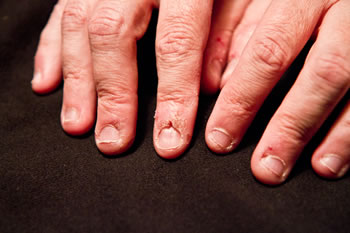

Good-natured, inviting animal tales." - Kirkus Reviews "The veterinarian's second book of gently told tales from his practice are heartwarming and heartbreaking."- The Sacramento Bee "This is a wonderfully written book.It is filled with what has become trademark humor and gentle touch. Wells weaves in the struggles of his own life and marriage with his wife's successful fight against recurrent cancer, and their adoption of an orphan from Korea. There are also moving stories of difficult births and life-saving efforts in nighttime winter snows. Dealing with the unexpected-llamas who don't want their nails trimmed, teenagers looking to get high on feline distemper vaccine, a herd of Scottish Highland cattle trying to protect a calf from the vet-makes for some high-tension reading. When your cat uses their toys to bite and claw at, reinforce the good behaviour with affection and a treat."Veterinarian Wells returns with another collection of warm, humorous tales of the animals he treats and the people who own and care for them. You can help them to exercise this natural instinct by providing toys that they can bite and claw to their heart’s delight, which then distracts them from your limbs. This is more likely to occur with outdoor cats that encounter territorial disputes, or cats that have a history of abuse and are frightened easily. Try to avoid allowing your pet into situations in which they become aggressive. Always reinforce good behaviour with treats, and never try to physically discipline your pet: they won’t understand the message this way.Īggressive biting will often be accompanied by hissing, spitting and a defensive, arched posture.

Even when you train a cat to stop biting, all animals can occasionally forget the lesson and act out of instinct. Your pet should learn that this kind of behaviour isn’t acceptable, or they will continue to use it as a way of expressing their fear or frustration. It’s important to stop cats biting out of aggression. Aggressive cat biting is accompanied by other signs that your cat is in a fighting mode, whether this is directed towards a person or another animal. Biting during play is fairly easy to distinguish from aggressive behaviour: these little nips won’t cause much damage, and are over quickly. You decrease the likelihood that they will bite again be respecting this, and letting your cat do their own thing, rather than insisting on further affection.Ĭats often bite during play because they are expressing their natural hunting instinct.Īlthough cat biting will often just be a warning nip or over-excited play, it can sometimes become an expression of aggression. While an owner may think a bite has come from nowhere, for a cat the action is entirely justified. Your cat is sending a message in this situation: they’ve had enough. It’s hard to tell when a cat has had enough of stroking, but learning to read your cat’s body language will help you to know when a bite might be coming. One of the most common complaints from cat owners is the sudden change in attitude that can occur during petting: one second a cat may be loving the attention, the next they’re snapping at your fingers! For felines, there’s a fine line between enjoyable handling and irritating petting. It’s important to understand what your cat is communicating! When cats bite, they’re telling you that they aren’t enjoying the contact they’re receiving. Learn more about the reasons behind why cats bite in order to help to stop any unnecessary biting.Ĭats usually bite because they’re communicating messages or want you to stop doing something. Allowing and encouraging this natural instinct is important for felines, but there is a fine line between engaging in stimulating play and allowing aggressive behaviour. It’s important to understand that cat biting isn’t always done out of aggression.Ĭats are natural born predators, and as such seemingly aggressive actions such as biting, pouncing and clawing make up a large part of their play.

There are many reasons as to why a cat might suddenly start biting, seemingly unprovoked. Learn more about the reasons why cats bite and the best ways to stop it with our guide and tips. It's not pleasant if you have a cat that always seems to bite you.


 0 kommentar(er)
0 kommentar(er)
